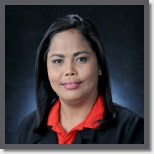

Miss Nimfa Llani P. Taupo, MSCS
Head, Computer Studies Department
Bachelor of Science in Computer Science

Career Opportunities
Course Description
ITE101 -
This course provides an overview of computers, number systems, data types and representations, digital logic systems, assembly and machine language, compilers and translators, operating systems, and internet working.
ITE102 -
This course is designed to familiarize students with the principles of logic formulation.
It covers discussions from the basics of mathematical functions and operators to
the design and user of such techniques as codes, indicators, control breaks and report
handling. The tools of problem solving, including flowcharts, pseudo code and Nassi-
ITE103 -
This course introduces the students to the fundamentals of logic formulation together with their implementation in the C programming language. It allows the student to learn and apply the art and style of procedural programming to solve computational problems adhering to the standards and guidelines of documentation. It includes discussion on I/O statements, loop and branching instructions, and creating functions and procedures.
ITE104 -
This course is a continuation of Fundamentals of Problem solving and Programming
1. The Course includes extensive and advance discussions on problem solving techniques
and algorithms designs. It also includes basic discussion on Data Structures.
Page 1
ITE105 -
This course opens with the basic concepts and bird’s eye view of logic followed by the theory of sets, number theory, algebraic relations and the notion of combinatory. It extends to graph theory, algebraic structures, abstract algebra, linear algebra and basic automata.
ITE107 -
This course provides knowledge needed to plan and deliver well-
ITE110 -
The course introduces ethics and ethical theories; provides discussions on the ethical dilemmas and issues facing IT practitioners. An appreciation and discussion of the Code of Ethics of IT Professionals; cybercrimes and appropriate Philippine Laws are also included.
ITE122 -
This course provides an overview of the architecture and organization of a computer, how it is built. It includes a discussion of the CPU, memory, I/O organization and peripherals. It includes application of Assembly Language Programming.
Page 2
ITE400 -
This is intended to provide significant educational and practical experiences in computing fields. It provides an opportunity for students to gain valuable practical I.I. related work experience.
CN1 -
This course teaches students the skills needed to obtain entry-
CN2 -
This course prepares students for jobs as network technicians. It also helps students
develop additional skills required for computer technicians. It provides a basic
overview of routing and remote access, addressing, and security. It also familiarizes
students with servers that provide e-
Page 3
CN3 -
This course familiarizes students with the equipment applications and protocols installed
in enterprise networks, with a focus on switched networks, IP Telephony requirements,
and security. It also introduces advanced routing protocols such as Enhanced Interior
Gateway Routing Protocol (EIGRP) and Open Shortest Path First (OSPF) Protocol. Hands-
CN4 -
This course introduces students to network design processes using two examples; a
large stadium enterprise network and a medium-
MA6T -
A study of sequence and its limits, the limit of function, continuity and derivatives. The emphasis of this course is on skills and solution to verbal problems in optimization, curve tracing, time rates and circular motion. The course extends to indeterminate forms and partial derivatives, etc.
Page 4
ITE112 -
This course covers the different phases of systems development focusing on analysis and design. Students will learn the rudiments of systems development through a feasibility study.
ITE113 -
This course provides an overview of the software engineering process. Topics include
requirement analysis, analysis modeling, software design fundamentals, software testing,
quality assurance, quality processes and software maintenance. Principles of object-
ITE114 -
This course deals with the study of fundamental concepts in the design and implementation of current high level programming languages; syntax and translation, language definition structure; elementary and structured data types. Abstraction mechanisms, sequence and data control, run time considerations.
ITE115 -
This course covers basic principles and techniques for analyzing the complexity of algorithm, algorithm design techniques and the development of efficient algorithm for solving problem that arise frequently in computer application.
Page 5
ITE116 -
This course deals with the advanced study of data structures and algorithm. It includes discussion on abstract data types implementation; arrays, stacks, queues, linked lists, mappings, trees, and graphs; internal and external searching and sorting techniques.
ITE118 -
This course provides the students with the fundamental understanding of object-
ITE119 -
This course introduces the students to the concepts of relational databases, data models and relational database design. The course requires students to do a database project, which will involve actual database design and application development. It will also familiarize students with database development tools.
This course is intended for students to appreciate the value of databases and enable
them with the adequate skills needed to plan, analyze and design databases. With
format tools and foundation concepts, students are equipped with a better understanding
on how to build and eventually use databases for various purposes.
Page 6
ITE120 -
This course concentrates on the advance topics on database security, integrity, concurrency
control, and recovery. Topics include distributed databases, object-
ITE121 -
The course provides an overview of the principles underlying number systems, logic
gates, Fixed-
ITE123 -
This course provides an introduction to the concepts, theories and components that serve as the bases for the design of classical and modern operating systems. Topics include process and memory management, process synchronization and deadlocks.
ITE127 -
This course introduces the formal models of computing and their relation to formal languages.
ITE128 -
This course introduces the students to modeling and simulation concepts. Topics discussed in the course includes, system analysis and classification, abstract and simulation models, heterogeneous models. It also covers pseudorandom number generation and testing, queuing systems, Monte Carlo method, and continuous simulation. Simulation experiment control.
Page 7
ITE301 ITE FREE ELECTIVE 1
ITE302 ITE FREE ELECTIVE 2
ITE303 ITE FREE ELECTIVE 3
The study covers the current development in the field of information technology either in the methodologies and approaches to computerization or in technology. Topics that will inform students what computerization stands for and where they stand in today’s society
Page 8
(046) 431-
Objectives
Provide a background in modern computing systems and theoretical aspects and applications of computer studies;
Help students develop problem-
Challenge students to consider the ethical and social impacts of technology, enabling them to take responsible action with Christian values; and
Prepare students for continued learning in a rapidly changing environment and disciplines.
Applications Developer
Computer Science Instructor
Database Programmer / Designer
Information Security Engineer
San Sebastian College-

Quality Assurance Engineer
Researcher
Systems Developer
Systems Analyst
The Bachelor of Science in Computer science (BSCS) is a four year program that trains
students to have the ability to develop and manage complex and reliable software
systems. It provides a comprehensive and in-


Manila-
(046)431-

Nurturing the mind, empowering the heart
| Administration |
| VMVO |
| History |
| Seal |
| Graduate School of Business |
| College |
| High School |
| Grade School/Pre-school |
| CABAHM |
| CASN |
| CCJE |
| CECST |
| Requirements |
| Sebastinian Echo |
| ICT Department |
| Medical & Dental |
| Recoletos Outreach Program |
| Registrar |
| St. Thomas of Villanova Libraries |
| Jobs |
| Invitation to Bid |